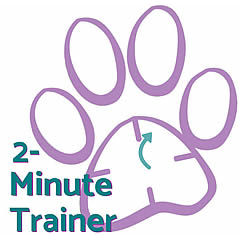It’s odd but true.
Teaching dogs new stuff – fun behaviors like “Put your toys away,” or “give paw” are sometimes easier than solidifying behaviors that the dog already “knows” how to do.
We think it goes back to the most powerful force in the universe. Some may say that’s gravity. We know it’s habit.
Battling habit

One of our students developed the habit of bending her arms up when calling her puppy. It was her way of avoiding her hands being licked, which she doesn’t like. What she achieved, on the positive side, is replicating the obedience signal for “sit.” Her dog approaches within about three feet and her dog, watching her hands go up, sits.
On the negative side, her dog never comes close enough to touch. Which means, even if he has a fantastic recall (come), she won’t be able to get hold of him if she needs to.
Be mindful of what you teach your dog! They’re always paying attention and always learning.
Another universal force
Just as powerful as habit, instinct is difficult to “untrain.”
Dogs are predators, so they chase moving things. Some more than others, depending on the breed and drive of the dog. If your dog is fascinated by moving objects, from balls to bicycles, it may be too much to ask to consider off-leash walks. A squirrel crossing your path could mean a lost dog.
Dogs are guardians, so they bark at sounds around their territory. You may not ever be able to stop your dog from alerting at the doorbell, but you may be able to modify his/her behavior. If you give your dog a “job” or routine to perform when the doorbell rings, with lots of practice and repetition, you may get habit to take over from instinct.
Fighting the status quo
It’s certainly easier in the short term to manage dog behaviors than to modify them. The problem with management, rather than training, is that you’re always the one responsible for your dog’s good behavior. If the doorbell rings and you manage your dog by locking him in a room away from the door, you’re always stressed by the time you answer the bell.
If, however, you’ve trained your dog to go “Place!” when the doorbell rings, your dog is responsible for his behavior. Your dog knows what he’s supposed to do, knows he’s making a good decision, and knows he’ll be rewarded for his effort.
And it’s much less stressful for everyone.






